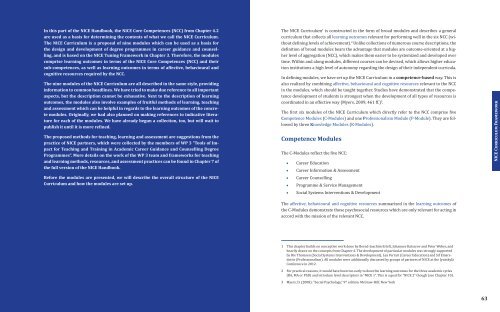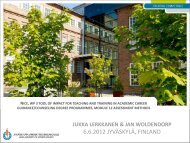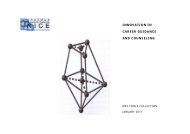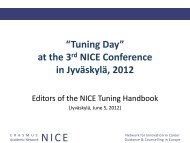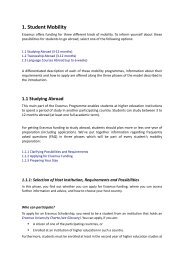NICE HANDBOOK â Academic training of Career ... - Nice-network.eu
NICE HANDBOOK â Academic training of Career ... - Nice-network.eu
NICE HANDBOOK â Academic training of Career ... - Nice-network.eu
Create successful ePaper yourself
Turn your PDF publications into a flip-book with our unique Google optimized e-Paper software.
In this part <strong>of</strong> the <strong>NICE</strong> Handbook, the <strong>NICE</strong> Core Competences (NCC) from Chapter 4.2are used as a basis for determining the contents <strong>of</strong> what we call the <strong>NICE</strong> Curriculum.The <strong>NICE</strong> Curriculum is a proposal <strong>of</strong> nine modules which can be used as a basis forthe design and development <strong>of</strong> degree programmes in career guidance and counselling,and is based on the <strong>NICE</strong> Tuning Framework in Chapter 3. Therefore, the modulescomprise learning outcomes in terms <strong>of</strong> the <strong>NICE</strong> Core Competences (NCC) and theirsub-competences, as well as learning outcomes in terms <strong>of</strong> affective, behavioural andcognitive resources required by the NCC.The nine modules <strong>of</strong> the <strong>NICE</strong> Curriculum are all described in the same style, providinginformation to common headlines. We have tried to make due reference to all importantaspects, but the description cannot be exhaustive. Next to the description <strong>of</strong> learningoutcomes, the modules also involve examples <strong>of</strong> fruitful methods <strong>of</strong> learning, teachingand assessment which can be helpful in regards to the learning outcomes <strong>of</strong> the concretemodules. Originally, we had also planned on making references to indicative literaturefor each <strong>of</strong> the modules. We have already begun a collection, too, but will wait topublish it until it is more refined.The proposed methods for teaching, learning and assessment are suggestions from thepractice <strong>of</strong> <strong>NICE</strong> partners, which were collected by the members <strong>of</strong> WP 3 “Tools <strong>of</strong> Impactfor Teaching and Training in <strong>Academic</strong> <strong>Career</strong> Guidance and Counselling DegreeProgrammes”. More details on the work <strong>of</strong> the WP 3 team and frameworks for teachingand learning methods, resources, and assessment practices can be found in Chapter 7 <strong>of</strong>the full version <strong>of</strong> the <strong>NICE</strong> Handbook.Before the modules are presented, we will describe the overall structure <strong>of</strong> the <strong>NICE</strong>Curriculum and how the modules are set up.The <strong>NICE</strong> Curriculum 1 is constructed in the form <strong>of</strong> broad modules and describes a generalcurriculum that collects all learning outcomes relevant for performing well in the six NCC (withoutdefining levels <strong>of</strong> achievement). 2 Unlike collections <strong>of</strong> numerous course descriptions, thedefinition <strong>of</strong> broad modules bears the advantage that modules are outcome-oriented at a higherlevel <strong>of</strong> aggregation (NCC), which makes them easier to be systemized and developed overtime. Within and along modules, different courses can be devised, which allows higher educationinstitutions a high level <strong>of</strong> autonomy regarding the design <strong>of</strong> their independent curricula.In defining modules, we have set up the <strong>NICE</strong> Curriculum in a competence-based way. This isalso realized by combining affective, behavioural and cognitive resources relevant to the NCCin the modules, which should be taught together. Studies have demonstrated that the competencedevelopment <strong>of</strong> students is strongest when the development <strong>of</strong> all types <strong>of</strong> resources iscoordinated in an effective way (Myers, 2009, 461 ff.) 3 .The first six modules <strong>of</strong> the <strong>NICE</strong> Curriculum which directly refer to the NCC comprise fiveCompetence Modules (C-Modules) and one Pr<strong>of</strong>essionalism Module (P-Module). They are followedby three Knowledge Modules (K-Modules).Competence ModulesThe C-Modules reflect the five NCC:◆◆◆◆◆◆◆◆◆◆<strong>Career</strong> Education<strong>Career</strong> Information & Assessment<strong>Career</strong> CounsellingProgramme & Service ManagementSocial Systems Interventions & DevelopmentThe affective, behavioural and cognitive resources summarized in the learning outcomes <strong>of</strong>the C-Modules demonstrate those psychosocial resources which are only relevant for acting inaccord with the mission <strong>of</strong> the relevant NCC.<strong>NICE</strong> Curriculum Framework1 This chapter builds on conceptive work done by Bernd-Joachim Ertelt, Johannes Katsarov and Peter Weber, andheavily draws on the concepts from Chapter 4. The development <strong>of</strong> particular modules was strongly supportedby Rie Thomsen (Social Systems Interventions & Development), Lea Ferrari (<strong>Career</strong> Education) and Sif Einarsdottir(Pr<strong>of</strong>essionalism). All modules were additionally discussed by groups <strong>of</strong> partners <strong>of</strong> <strong>NICE</strong> at the JyväskyläConference in 2012.2 For practical reasons, it would have been too early to describe learning outcomes for the three academic cycles(BA, MA or PhD) and introduce level descriptors in “<strong>NICE</strong> 1”. This is a goal for “<strong>NICE</strong> 2” though (see Chapter 10).3 Myers, D. (2008): “Social Psychology,” 9 th edition. McGraw-Hill: New York63


